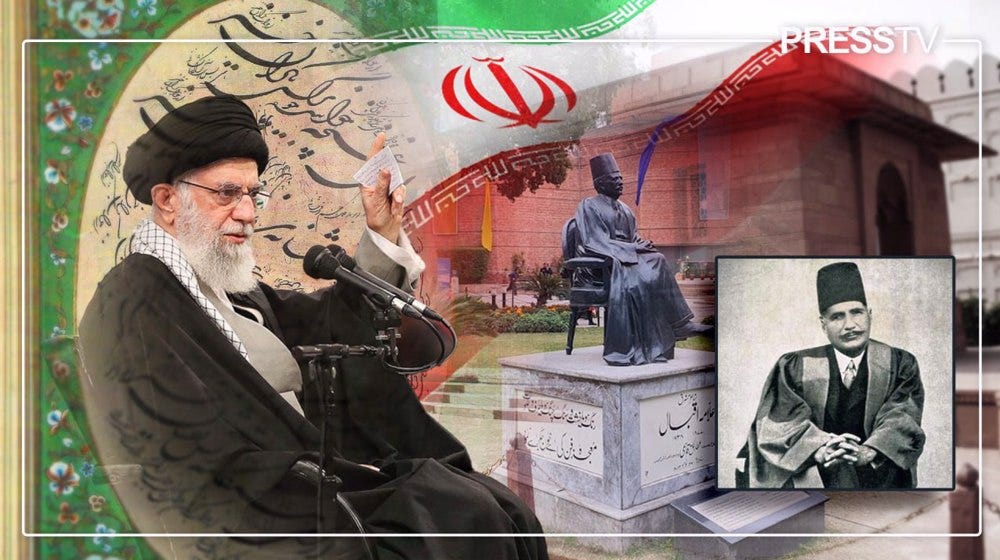Poetic Genius: Allama Iqbal Lahori’s Words Through the Lens of Ayatollah Khamenei
Beyond Borders: Iqbal’s Dream of Muslim Unity in Ayatollah Khamenei’s Teachings
The legacy of Allama Muhammad Iqbal Lahori, the renowned philosopher, poet, and spiritual father of Pakistan, continues to resonate across borders, inspiring generations with his vision of Islamic revival and intellectual awakening. His profound poetry and philosophical insights have drawn admiration from scholars, leaders, and thinkers worldwide—among them, Iran’s Leader, Ayatollah Seyyed Ali Khamenei, who has frequently referenced Iqbal’s works as a source of wisdom and guidance.
The Timeless Relevance of Iqbal’s Poetry
Allama Iqbal (1877–1938) remains one of the most influential Muslim thinkers of the modern era. His Persian and Urdu verses, particularly in Asrar-e-Khudi (Secrets of the Self), Rumuz-e-Bekhudi (Mysteries of Selflessness), and Javed Nama, explore themes of self-realisation, Islamic unity, and resistance against oppression. His famous concept of Khudi (selfhood) emphasises the empowerment of the individual through faith and action, a message that transcends time and geography.
Iqbal’s poetry is not merely literary; it is a call to action. His verses challenge Muslims to rise above colonial subjugation, intellectual stagnation, and moral decline. He envisioned a unified Islamic world, free from Western hegemony, where the Ummah could reclaim its intellectual and spiritual leadership.
Ayatollah Khamenei’s Admiration for Iqbal
Ayatollah Khamenei, a scholar deeply versed in literature and philosophy, has often cited Iqbal’s poetry in his speeches, highlighting its revolutionary and spiritual essence. The Iranian Leader, himself a poet and translator, has described Iqbal as a "guide for the Muslim world" whose words awaken consciousness and resistance.
In one of his addresses, Ayatollah Khamenei remarked:
"Allama Iqbal is not just a poet; he is a philosopher, a visionary whose poetry carries the message of Islamic awakening. His call for self-discovery and unity is exactly what the Muslim world needs today."
Ayatollah Khamenei has also emphasised Iqbal’s warnings against Western cultural imperialism, echoing the poet’s concerns about Muslims losing their identity in the face of materialism and secularism. Iqbal’s famous couplet—
"Muslim hai tu, ‘azm-o-yaqeen paida kar / Ke Muhammad (S) ki ummat hai, yeh sarmaya hai tera"
(“If you are a Muslim, cultivate resolve and faith / For you belong to the Ummah of Muhammad (S), this is your capital.”)
—has been referenced by the Iranian Leader as a reminder of the Ummah’s spiritual strength.
A Shared Vision for Islamic Unity
Both Iqbal and Ayatollah Khamenei share a deep concern for the fragmentation of the Muslim world. Iqbal’s dream of a united Islamic civilisation finds parallels in the Iranian Leader’s advocacy for Muslim solidarity against common challenges, whether political oppression, economic exploitation, or cultural invasion.
Iqbal’s admiration for the Islamic Revolution of Iran—though he passed decades before its occurrence—can be inferred from his poetic support for movements that sought to restore Islamic governance. Ayatollah Khamenei, in turn, sees Iqbal’s philosophy as a precursor to the revolutionary spirit that now shapes resistance movements across the Muslim world.
Conclusion: Iqbal’s Living Legacy
Allama Iqbal’s words remain as relevant today as they were in the early 20th century. Through the lens of Ayatollah Khamenei’s appreciation, we see how Iqbal’s poetry transcends national boundaries, serving as a bridge between Iran, Pakistan, and the broader Muslim world. His message of self-awareness, faith, and resistance continues to inspire those who seek justice, dignity, and Islamic revival.
As the Muslim world faces new challenges, the voices of visionaries like Iqbal and leaders like Ayatollah Khamenei remind us that the path to empowerment lies in unity, faith, and an unwavering commitment to divine principles. Iqbal’s poetry is not just a relic of the past—it is a roadmap for the future.
Source: PressTv


